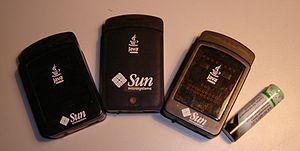
Sun SPOT
Encyclopedia

Wireless sensor network
A wireless sensor network consists of spatially distributed autonomous sensors to monitor physical or environmental conditions, such as temperature, sound, vibration, pressure, motion or pollutants and to cooperatively pass their data through the network to a main location. The more modern...
mote
Sensor node
A sensor node, also known as a mote , is a node in a wireless sensor network that is capable of performing some processing, gathering sensory information and communicating with other connected nodes in the network...
developed by Sun Microsystems
Sun Microsystems
Sun Microsystems, Inc. was a company that sold :computers, computer components, :computer software, and :information technology services. Sun was founded on February 24, 1982...
. The device is built upon the IEEE 802.15.4
ZigBee
ZigBee is a specification for a suite of high level communication protocols using small, low-power digital radios based on an IEEE 802 standard for personal area networks. Applications include wireless light switches, electrical meters with in-home-displays, and other consumer and industrial...
standard. Unlike other available mote systems, the Sun SPOT is built on the Squawk
Squawk virtual machine
Squawk is a Java micro edition virtual machine for embedded system and small devices. Most virtual machines for the Java platform are written in low level native languages such as C/C++ and assembler; what makes Squawk different is that Squawk's core is mostly written in Java...
Java Virtual Machine
Java Virtual Machine
A Java virtual machine is a virtual machine capable of executing Java bytecode. It is the code execution component of the Java software platform. Sun Microsystems stated that there are over 4.5 billion JVM-enabled devices.-Overview:...
.
Processing
- 180 MHz 32 bit ARM920T coreARM architectureARM is a 32-bit reduced instruction set computer instruction set architecture developed by ARM Holdings. It was named the Advanced RISC Machine, and before that, the Acorn RISC Machine. The ARM architecture is the most widely used 32-bit ISA in numbers produced...
- 512K RAM - 4M Flash - 2.4 GHz IEEE 802.15.4 radio with integrated antenna
- AT91 timer chip
- USB interface
Sensor Board
- 2G/6G three-axis accelerometerAccelerometerAn accelerometer is a device that measures proper acceleration, also called the four-acceleration. This is not necessarily the same as the coordinate acceleration , but is rather the type of acceleration associated with the phenomenon of weight experienced by a test mass that resides in the frame...
- Temperature sensor
- Light sensor
- 8 tri-color LEDs
- 6 analog inputs
- 2 momentary switches
- 5 general purpose I/O pins and 4 high current output pins
Battery
- 3.7V rechargeable 750 mAh lithium-ion battery
- 30 uA deep sleep mode
- Automatic battery management provided by the software
Networking
The motes communicate using the IEEE 802.15.4 standard including the base-station approach to sensor networking. The SPOT supports the IEEE 802.15.4 MAC layer, on top of which e.g. ZigbeeZigBee
ZigBee is a specification for a suite of high level communication protocols using small, low-power digital radios based on an IEEE 802 standard for personal area networks. Applications include wireless light switches, electrical meters with in-home-displays, and other consumer and industrial...
can be built.
Security
Sun Labs has reported highly optimized implementations of RSA and Elliptic Curve CryptographyElliptic curve cryptography
Elliptic curve cryptography is an approach to public-key cryptography based on the algebraic structure of elliptic curves over finite fields. The use of elliptic curves in cryptography was suggested independently by Neal Koblitz and Victor S...
(ECC) that can be used on small embedded devices.
Software
The device's use of Java device drivers is particularly remarkable as Java is known for its ability to be hardware-independent. Sun SPOT uses a small Java ME (SquawkSquawk virtual machine
Squawk is a Java micro edition virtual machine for embedded system and small devices. Most virtual machines for the Java platform are written in low level native languages such as C/C++ and assembler; what makes Squawk different is that Squawk's core is mostly written in Java...
http://research.sun.com/projects/squawk) which runs directly on the processor without an OS. Both the Squawk VM and the Sun SPOT code are open source http://spots.dev.java.net
Development Tools
Standard Java IDEs (e.g. NetBeansNetBeans
NetBeans refers to both a platform framework for Java desktop applications, and an integrated development environment for developing with Java, JavaScript, PHP, Python, Groovy, C, C++, Scala, Clojure, and others...
) can be used to create SunSPOT applications.
The management and deployment of application are handled by ant scripts, which can be called from your IDE, the command line, or from the tool provided with the SPOT SDK, "solarium"
Availability
The first limited-production run of Sun SPOT development kits were released April 2, 2007, after months of delays. This introduction kit includes two Sun SPOT demo sensor boards, a Sun SPOT base station, the software development tools, and a USB cable. The software is compatible with Windows XP, Mac OS X 10.4, and most common Linux distributions. It is unknown if any ZigBee-compliant stack code has been made available but on the CD some demo codes are provided.The entire project, hardware, operating environment, Java virtual machine, drivers and applications, is available as open source.
External links
- Official website
- Open Source
- Flocking blimps powered by "B" SPOTs
- Rob Tow's Sun SPOT page
- David G. Simmons' Sun SPOT blog
- Sun SPOTs In Action at jazoon 2007
- eBones: information to create add-on boards for the eSPOT
- Oregon State Univiersity's SPOTBot Project
- UNIPE Brazilian university scientific project called MOVER
- Site in French created by ENSISA students
- Homepage of the Karlsruhe Sensor Networking Project which uses Sun SPOTs and develops software for them
- Buy accessories, batteries, add-on boards at www.sunspotstore.com

